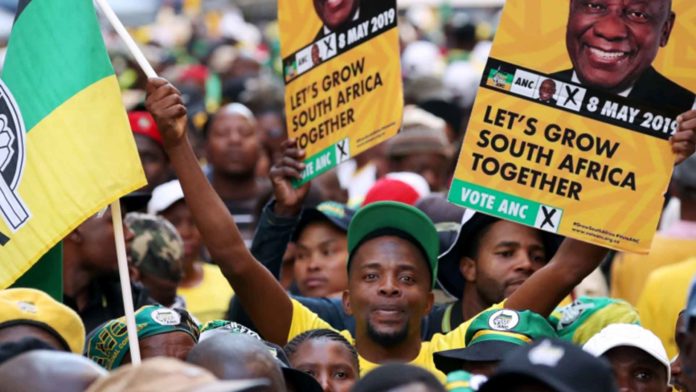In South Africa, the public went to the polls on the morning of May 8 to elect a new group of national parliamentarians, governors, and state councilors. Although weak voter turnout and the significant success of parties on both sides of the political spectrum indicate that democracy in South Africa is maturing, it also reveals a divided social structure.
Some aspects of this election, which is the sixth since the end of the apartheid regime in 1994, are rather remarkable. The African National Congress (ANC), who gained under 60% of the vote for the first time since 1994, still managed to win the majority. The reason for the party’s loss of votes over the years is also a matter of great importance for South African voters. Indeed, problems of unemployment and an unequal distribution of income in the country have clearly had an effect. As for Ramaphosa, who took the reins after the dismissal of Jacob Zuma by the ANC, and his reassurances that he would solve the problem of unemployment in the new era, the South African people’s belief that the time had come for him to make his promises a reality contributed greatly to his new chance at leadership.
Secondly, the election results showed that the opposition was experiencing an identity crisis. Although the country’s main opposition party, the Democratic Union (DA), won 20% of the vote, this is the first election in which the party’s votes have not increased. The DA, still considered as a white party by the black community, has lost some of its conservative supporters to the Liberation Front, which is a right-wing Afrikaner minority party.
Another striking result of the South African elections was the support for the radical EFF. The Economic Freedom Warriors (EFF), who want to seize whites’ land without compensation and nationalize the gigantic mining industry, has become one of the fastest growing parties in this election, increasing its share of the vote from 6% to 10%. More importantly, it was the official opposition party in three provinces. Nevertheless, it will be interesting to see how the EFF, accused of populism and divisive discourse by moderate political parties in South Africa, will maintain its base of support over the next five years.
Fourth, the rise of Afrikaner nationalists stands out. One of the biggest surprises was the growth of the Freedom Front Plus (VF +). This predominantly Afrikaner party, which claims to fight for the rights of minority groups, almost doubled its support and became the country’s fifth largest party after the Zulu Inkatha Freedom Party. One wonders how such growth was possible, considering that the VF + has spent the last five years in a state of uncertainty. According to one theory, calls for the expropriation of land without compensation from the ANC and the EFF prompted some DA supporters to turn to a tougher party, the VF +, because they feared that the DA was unable to protect their interests. Their message was simple: White Africans were besieged and had to protect their interests as a minority group in South Africa.
The last striking result of the South African elections was the decline in voter turnout, which was the lowest since the transition to democracy in 1994. According to Africa Check, one in four people did not register for elections. There are two ways to interpret this issue. First, voter’s lack of interest: part of the population lost confidence in the political leadership of the country and therefore chose to stay home. The second interpretation is that it is just a feature of a mature democracy. Perhaps the lesson is that leaders need new ways to reach out to voters, especially the 6 million young people in South Africa who did not register to vote. It would be too simple to say that young people are not interested in politics or current events in the country. The rising unemployment rate has affected these youth the most, and they were at the forefront of demonstrations that changed the status quo. In any case, this general election shows us that young South Africans can be active in civil society without feeling the need to go to the polls.
CENTER FOR AFRICAN STUDIES
Center for Africa Studies (AFRAM) which located in Ankara, is an organization facilitating under the administration of African Affairs Council (AFAC). It makes various researches about Africa to enhance economic and cultural bounds between Africa and Turkey. AFRAM’s publishings has been shared with different institutions as they require to obtain.
AFRICA OBSERVATORY
Africa Observatory is one the publishing of AFRAM and it has been published each two weeks. It has been delivered to different institutions via e-mail.






